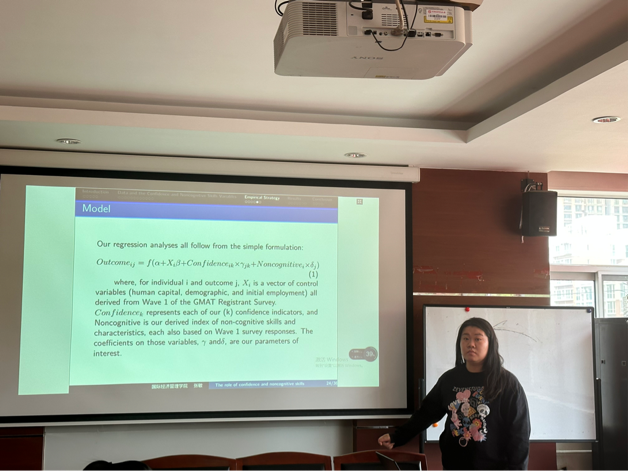国际经济管理学院研究生workshop 2023年春季学期第8期
时间: 2023-04-25 10:49:00
研究生workshop由首都经济贸易大学国际经济管理学院主办。主要内容:一是研究生报告前沿或经典文献,二是研究生报告自己的研究或研究设想。论坛宗旨是:为学院师生搭建一个学术交流平台,营造浓厚学术氛围;通过对经典论著或前沿文献的研讨,拓宽研究生的理论视野,提升研究生的前沿方法运用能力,帮助研究生提高论文写作质量。
本期workshop
报告人:吴俊珺(2021级博士研究生)
导师:高逸尘
报告论文:《Educational Investment in Spatial Equilibrium: Evidence from Indonesia》Working Paper, 2023. 作者:Allan Hsiao
《空间均衡中的教育投资:来自印度尼西亚的证据》
报告摘要:
This paper quantifies the long-run aggregate and distributional effects of Indonesia’s Sekolah Dasar INPRES program, one of the largest school construction programs in history. I do so with a spatial equilibrium model in which students invest in education, then migrate for employment after graduation. I find that the program increased aggregate output by 8%, with large gains for rural students but small gains for rural regions. Labor market integration magnifies each effect, as education and migration are complements: access to high urban wages raises the returns to education, but also encourages students to leave rural regions behind.
报告人:张敏(2021级博士研究生)
导师:李鲲鹏
报告论文:《The role of confidence and noncognitive skills for post-baccalaureate academic and labor market outcomes》Journal of Economic Behavior&Organization, 2017
作者:Weiwei Chen a, Wayne A. Grove b, Andrew Hussey
《自信和非认知技能对学士学位后学术和劳动力市场结果的作用》

报告摘要:
Increasingly researchers include information about noncognitive abilities in their analyses of similar people's educational choices and subsequent labor market outcomes. We contribute to this literature by considering the dual roles of confidence in one’s abilities and noncognitive skills and characteristics in predicting several subsequent MBA program and employment outcomes among a sample of GMAT test takers, with a focus on identifying possible gender differences in these relationships. Self-reported noncognitive skills correlate similarly for men’s and women’s managerial, earnings and employment satisfaction outcomes. In contrast, though, distinct gender differences emerge regarding perceptions of one's mathematical and verbal ability—with confidence in quantitative ability especially associated with men’s and confidence in verbal ability mainly associated with women’s outcomes. Non-linearity analysis reveals that lower earnings are correlated with men who have low confidence in their quantitative ability and with women who have high confidence in their verbal ability.




